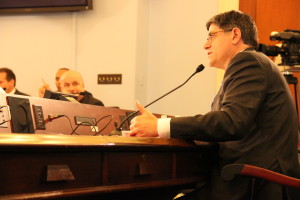WASHINGTON — The Republican point man on the budget, Paul Ryan, grilled Treasury Secretary Jacob Lew on Tuesday about the administration’s proposed spending plan, saying the White House budget would lead to higher taxes on middle-income taxpayers.
Appearing before Ryan’s House Budget Committee, Lew tried his best to sell President Barack Obama’s budget for the next fiscal year, touting spending cuts and new revenues as the path to growth.
But Ryan, the Wisconsin Republican and his party’s nominee for vice president last year, dissented.
“The president’s budget is a disappointment because it’s a missed opportunity,” Ryan said. “We need a new approach in Washington to meet our country’s most pressing challenges.”
For Ryan and the Republicans, those challenges include small businesses that must contend with a complicated tax code.
“Among the industrialized world, we have a unique disproportion of businesses that file as individuals,” Ryan said.
Instead of creating loopholes for businesses to file its taxes, “we need to lower the rates — that way these businesses get to decide for themselves how to invest their capital, how to create jobs,” Ryan said.
Lew used the opening as a way to discuss revenue. “I think we share the concerns of small businesses. We look forward to working on a bipartisan basis to make sure there are strong incentives for small business,” he said. “The overall tax package is going to have to raise revenue.”
Revenue is the hot-button issue. Republicans have said the tax increases included in the year-end deal to avert the “fiscal cliff” are the last they will allow.The House has passed Ryan’s budget plan which calls for deep spending cuts and no new taxes; the Senate has passed a Democratic alternative that achieves cost reductions through a mix of tax increases and spending cuts. Obama has endorsed raising taxes on the wealthiest Americans and closing tax loopholes to raise revenue.
“You can’t get all the revenue you want to fuel all of this spending without taxing middle-class people,” Ryan said. “There are not enough high-income taxpayers to pay for all this spending.”
Ryan argued that some of the White House tax proposals, including health care and cigarette taxes, also disproportionately affect lower-income people.
Lew responded: “We dearly hope that people decide not to buy cigarettes, not to smoke, fewer young people smoke. We will get more benefits to this country through lower health care costs and better health.”
Ryan fired back, “If you want to get all this kind of tax revenue you are talking about, it doesn’t come from the movie-star or the hedge fund manager it will come from middle-income people, lower-income people.”
Ryan also pressed Lew on when he believes the country will hit the debt limit.
“It’s very challenging this year to make a precise prediction.” Lew said.
Lew instead urged Congress to act well ahead of the deadline on borrowing. “The right thing to do is to extend the debt limit and remove any uncertainty so we’re not in this place where people wonder how many days or weeks that we have,” he said.

